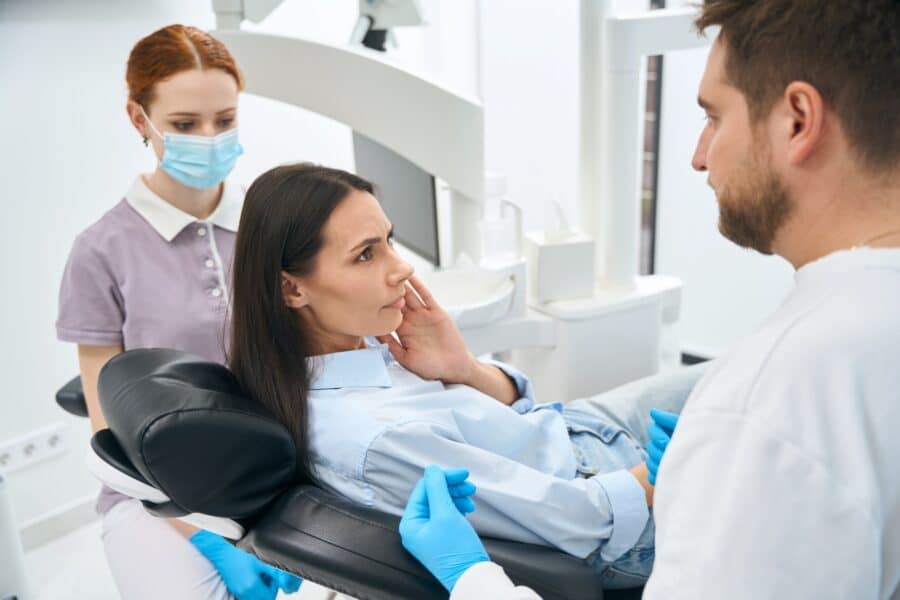Your dental condition plays an important role in your overall health and wellness. A healthy mouth also contributes to your confidence, as well as your overall physical and mental state.
Oral problems can affect anyone, and may range from simple tooth aches to aggravating conditions. Good dental health significantly affects your wellbeing, so it’s important to watch out for any common oral health conditions that you may experience. Knowing how to recognize dental health emergencies will help you to address them before they become worse.
Dental Health Problems to Watch Out For
Your oral health is also susceptible to various conditions, just like your body. It’s vital to know about the various health problems that can affect you. The following are some of the most common oral problems to watch out for.
Cavities
Dental Cavities are one of the most common oral health problems, affecting 60 to 90 percent of children and almost all adults based on the World Health Organization (WHO). Cavities are caused by the buildup of plaque on teeth, which results in acid destroying the tooth enamel as well as the outer coating.
Teeth with cavities will eventually deteriorate, and if left untreated will lead to permanent damage.
Causes
Plaque buildup, which leads to cavities, can be caused by one or more of the following reasons:
- Poor Oral Practice – Brushing is the one of the most basic practices for good oral hygiene. However, when it isn’t done properly or as often as necessary, it may lead to plaque buildup. Skipping flossing can also lead to cavities, since food and other foreign particles can get stuck between your teeth.
- Poor Diet – Eating too much sugar can increase your risk of developing cavities. The bacteria responsible for tooth decay feeds on sugar, which is why those who don’t practice good oral hygiene and consume too much sugar are more at risk of developing cavities. Your diet plays a huge role in your overall health, including dental health. A balanced diet with whole grains, fruits and vegetables helps to prevent any underlying causes of cavities.
- Tooth Grinding and Biting on Hard Foods – You may be unintentionally putting your teeth at higher risk of cavities when you grind them, or habitually bite and chew on hard foods. Too much pressure on the teeth can break down the enamel, which serves as the tooth’s outer protection.
Symptoms of Cavity
Just like other conditions, early detection and prevention are the best solutions to any budding dental problem. Symptoms of cavities to watch out for include the following:
- Tooth Pain
- Tooth Sensitivity
- Bad Breath
- Holes or Dark Spots on Teeth
- Broken or Chipped Teeth
Treatment
If you experience one or more symptoms of cavities, it’s best to visit your dentist to address the situation. Cavities can cause pain and discomfort, so you should seek medical attention as soon as possible. Treatments will vary depending on the severity of your condition, and the amount of damage your teeth have incurred.
You can visit familydentalhealth.com to learn more about the possible treatments for cavities and other dental health conditions.

Gum Diseases
Gum inflammation is also a common oral health problem. It’s usually a result of plaque buildup on the teeth due to poor dental hygiene. Gingivitis can make your gums swell and bleed; a much more serious form of gum disease, periodontitis, can come about as a result of untreated gingivitis.
Gum infection causes the gums to soften or bleed, which in turn causes the teeth to become unhinged or completely fall out.
How Does Gum Disease Develop?
The most common cause of gum disease is poor oral hygiene, which eventually leads to plaque accumulation on the teeth; this causes inflammation of the gums.
- Starches and sugars are the leading cause of plaque on your teeth. The bacteria responsible for cavities interact with the compounds left after food intake, which eventually eats up the enamel of your teeth.
- When plaque hardens and develops into tartar, it’s much more difficult to clean the teeth. Tartar also contains the bacteria responsible for gum problems.
- If left untreated, the plaque and tartar buildup on the teeth can cause gingivitis, which irritates and inflames the gum tissue around the base of your teeth.
- Continuous gum inflammation ultimately leads to periodontitis, which is a bacterial infection. The gums and teeth affected will eventually deteriorate, and form pockets filled with bacteria. Deep infections can cause tissue and bone loss, resulting to the loss of one or more teeth. Chronic inflammation will also put your immune system at risk.
Symptoms of Gum Disease
Some common symptoms of gum diseases are red or swollen gums, bleeding and loose teeth. Others may experience pain, sensitivity and irritation in their gums and mouths.
Treatment
It’s best to consult with a dentist if you experience any gum problems; a dentist can prescribe the necessary treatment for a gum infection, since it can vary depending on the seriousness of your condition.
Professional Cleaning – A dentist can deep clean your teeth, and remove any plaque and tartar buildup that cannot be cleaned by regular brushing and flossing.
- Prescription Medicine – Gum disease caused by bacterial infection can be solved through medication. Antibiotics may be prescribed to help in killing the bacteria and easing the inflammation of the gums.
- Surgery – In severe cases, where cleaning and medicine are not enough to treat gum problems, surgery can be performed to repair damaged gums and bones surrounding the teeth.
Oral Cancer
Cancer can develop in the mouth, just as in any other body part. Oral cancer can affect the lips, inside of the mouth, cheek, sinuses and even the pharynx (throat). It can start as a sore, which won’t subside even after practicing proper oral hygiene. Cancer in the mouth can be life threatening if not detected and treated immediately.
Common Causes of Oral Cancer
Oral cancer often starts as an inflammation in the mouth, which can be caused by the following factors:
- Smoking
- Consumption of Alcohol
- Family History
- Sun Exposure
Symptoms of Oral Cancer
It’s important to note that the symptoms for oral cancer can overlap with other oral health conditions. However, you can watch out for the following signs, and consult with a doctor if you experience any of them:
- Swelling, lumps or rough spots on the lips, gums or other areas of the mouth
- Appearance of white or red patches in the mouth
- Bleeding
- Numbness or pain around the face, mouth or neck
- Persistent irritation on the face and mouth that lasts for more than two weeks
- Soreness at the back of the throat
- Difficulty in moving the jaws and tongue
- Pain in the ear
- Weight loss
Treatment
The treatment for oral cancer is the same as many other cancers. You can have surgery to remove the cancerous cells, followed by chemotherapy and radiation; there are also various natural methods that may help significantly in the fight against cancer, so make sure you do your research and consider everything.
Injury
Although not technically a disease, injuries or trauma to the mouth and teeth affect many individuals. Injuries can range from a chipped tooth to abrasions on the gums and mouth. The best preventative measure against injury is to use a mouthguard when engaging in physical activities. Most cases of injuries result from the following:
- Sports – Contact and intense sports often lead to injuries such as gum bleeding or loss of teeth. It’s not too difficult to get injured when playing a sport involving bats, sticks and balls, several players moving around, running in close proximity and colliding with each other. Contact sports require players to wear a mouth piece to guard their mouths and teeth from possible trauma.
- Accidents at Home – Slipping and falling can cause injuries such as a cut on your mouth or loose and broken teeth. Children at home are also prone to knocking their teeth out if they’re not careful when playing. You can prevent accidents like this from happening at by cleaning the floors properly, and making sure that there’s nothing which could cause you or anyone else in the house to get hurt.
- Eating Hard Foods – Biting into something with too much force can break your teeth. Repeatedly applying too much pressure can also make them loose, and irritate your gums.
Treatment
There are a number of orthodontic treatments available to repair or replace broken and missing teeth.
- Implants – Can be used to replace one or two damaged or missing teeth. An implant is a prosthetic tooth, placed in the empty slot left by the last.
- Veneers – Minor injuries such as cracks or chips can be repaired using veneers. These are thin porcelain shells attached to the front of the teeth to cover up the damage. This material will eventually merge with the tooth.
- Crowns – Porcelain covers used to surround the entire surface of a tooth. These are usually used when a tooth is very damaged. Crowns look like normal teeth, and – just like veneers – will bond with the remaining tooth eventually.
- Complete Dentures – In severe cases, when most or all of the entire upper or lower jaw is lost, complete dentures act as a replacement for the set of missing teeth.
- Partial Dentures – These dentures are used by those with a few missing teeth on either row.
How To Prevent Oral Conditions
Your dental health is essential to the overall wellness of your body. The best way to avoid oral health conditions is by practicing proper oral hygiene. Aside from brushing and flossing regularly, here are some other ways to keep your mouth healthy:
Use Fluoride
Fluoride can help to prevent cavities, and is common in many oral hygiene products. Brushing and flossing using a fluoride-based product can help to prevent a person from getting cavities.
Use a Mouthwash After Brushing
Mouthwash with the antibacterial ingredient chlorhexidine can help to control plaque and to keep your gums healthy. Using a mouthwash regularly will also help to address bad breath and sensitive gums.
Avoid Smoking
Smoking will not only increase your risk of developing oral cancer, but will also make it difficult for you to recover from minor injuries in your mouth. Smoking harms your immune system, making it difficult for your tissues to heal themselves. You’re more likely to develop gum diseases if you’re a smoker, and the nicotine and tar found in tobacco products also cause bad breath and teeth discoloration.
Minimize Intake of Sugary Foods And Drinks
Most oral health conditions stem from plaque buildup leading to cavities. Bacteria that can cause damage to the teeth feed off the sugars stuck between them. Consuming large amounts of sweets and not practicing good oral hygiene can lead to irreversible damage to the teeth and gums. It’s advisable to have a balanced diet including fiber and protein-rich fruits and vegetables, while limiting the intake of sugar and starch products.
Regularly Visit Your Dentist
The best way to combat oral health problems is by regularly consulting your dentist for checkups and cleaning. It’s recommended to see a dentist twice yearly, for a routine dental examination. An oral exam can help to detect any budding health conditions and address them early on.
Dentists will inspect your mouth for any signs of cavity, gum disease or other oral health problems and prescribe the necessary treatment. If you’re experiencing any discomfort or pain in your teeth and gums, it’s best to seek medical attention so that any underlying conditions can be addressed.
Takeaway
Your oral health affects your way of life. Simple toothaches or gum soreness caused by poor oral hygiene will lead to more serious diseases if left alone. That’s why practising proper dental care can help a person to maintain a healthy set of teeth and gums. Remember: aside from flossing and brushing your teeth, it’s important to always watch out for budding oral problems.
The best way to address any oral condition is with the professional advice of a dentist. Keep in mind that the key to a healthy body is making sure that all aspects are in good condition, which includes your oral health.





